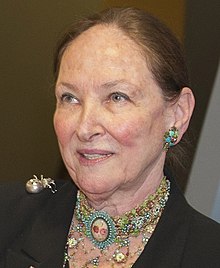Rosalie Abella
Rosalie Silberman Abella , FRSC (born July 1, 1946 in Stuttgart ) is a Canadian lawyer and a judge at the Supreme Court of Canada since 2004 .
Family and education
Silberman Abella was born to Jacob Silberman and his wife Fanny Krongold in a shelter for displaced persons . Her father, a trained lawyer, took care of the interests of displaced persons in the American occupation zone as a lawyer . Her paternal grandfather came from Sienno where he owned a bookshop. Her mother comes from a wealthy Jewish family. Silberman Abella's parents married on September 3, 1939. They had a young daughter who was murdered by the Germans. Both survived the Holocaust , the father in Theresienstadt concentration camp , the mother in Buchenwald concentration camp . In 1950 the family emigrated to Canada, where Jacob Silberman worked as an insurance agent until his death, as he was not allowed to practice law as a foreigner. Silberman Abella received musical support from her parents at an early age and was considered a child prodigy at the piano. She received numerous awards and became known nationwide through multiple television appearances. In 1964 she was one of the youngest graduates to receive a diploma in classical piano from the Royal Conservatory of Music in Toronto . At the same time, she completed her schooling with one of the top grade averages in the province of Ontario . This was followed by studies at the University of Toronto . There she was awarded the Bachelor of Arts in 1967 and the Bachelor of Laws in 1970 . On December 8, 1968, she married the historian Irving Abella . She has two sons with him, both of whom work as lawyers.
Professional background
In 1972, Silberman Abella was admitted to the bar. Until 1976 she practiced as a trial lawyer in her own law firm. In doing so, she mostly negotiated civil and criminal law cases . She was then appointed to a position as a judge at the Ontario Family Court . At the age of 29 she was not only the youngest female judge in Canada, but also the first Jewish woman in Canada to hold a judicial office. In addition to her work as a judge, she has held a number of prominent positions as an advisor to the Canadian government. In 1984 she was commissioned to work out a study on questions of equality in employment relationships. The formulas she worked out for equality on the one hand and discrimination on the other were adopted by the Supreme Court in 1989 in a fundamental decision on the Canadian Charter of Rights and Freedoms . She also advised the Prime Minister of Canada on questions of federalism in Canada and was a member of the Ontario Human Rights Commission . In March 1992, she rose to be a judge on the Ontario Court of Appeal . Silberman Abella is also involved in voluntary work. She is a member of the Committee against Forgetting of the United States Holocaust Memorial Museum and was curator of the McGill Institute for the Study of Canada . She has been a visiting professor several times , including at Harvard University and the Law School of the University of Toronto .
Award (selection)
Silberman Abella has received a total of 32 honorary doctorates . She was also admitted to the Royal Society of Canada as the first incumbent judge . In 2002 she was awarded the Queen Elizabeth II Golden Jubilee Medal and the following year she received, together with Bertha Wilson , the Gruber Justice Prize . In 2007 she was admitted to the American Academy of Arts and Sciences , and in 2018 to the American Philosophical Society . Also in 2018, Abella was awarded the Goler T. Butcher Medal .
Publications (selection)
- International Law and Human Rights: The Power and the Pity . In: MacGill Law Journal . Vol. 55 (2010), No. 4, ISSN 0024-9041 , pp. 871-887.
- Professionalism in the Justice System: the divine comedy of Roscoe Pound . In: UNB Law Journal . Vol. 1 (2002), ISSN 0077-8141 , pp. 3-13.
- Jewish perspectives on democracy and human rights . In: Justice . 2000, ISSN 0793-176X , pp. 12-15.
- The instructive power of outrage: remembering Nuremberg . In: MacGill Law Journal . Vol. 46 (2000), No. 1, ISSN 0024-9041 , pp. 113-120.
- Justice Beyond Orwell . Blais, Montreal 1985, ISBN 2-89073-554-0 .
See also
Web links
- Biography on the website of the Supreme Court (English)
- Biography in Jewish Women's Archive (English)
| personal data | |
|---|---|
| SURNAME | Abella, Rosalie |
| ALTERNATIVE NAMES | Abella, Rosalie Silberman (full name) |
| BRIEF DESCRIPTION | Canadian lawyer, Supreme Court Justice of Canada |
| DATE OF BIRTH | July 1, 1946 |
| PLACE OF BIRTH | Stuttgart |

